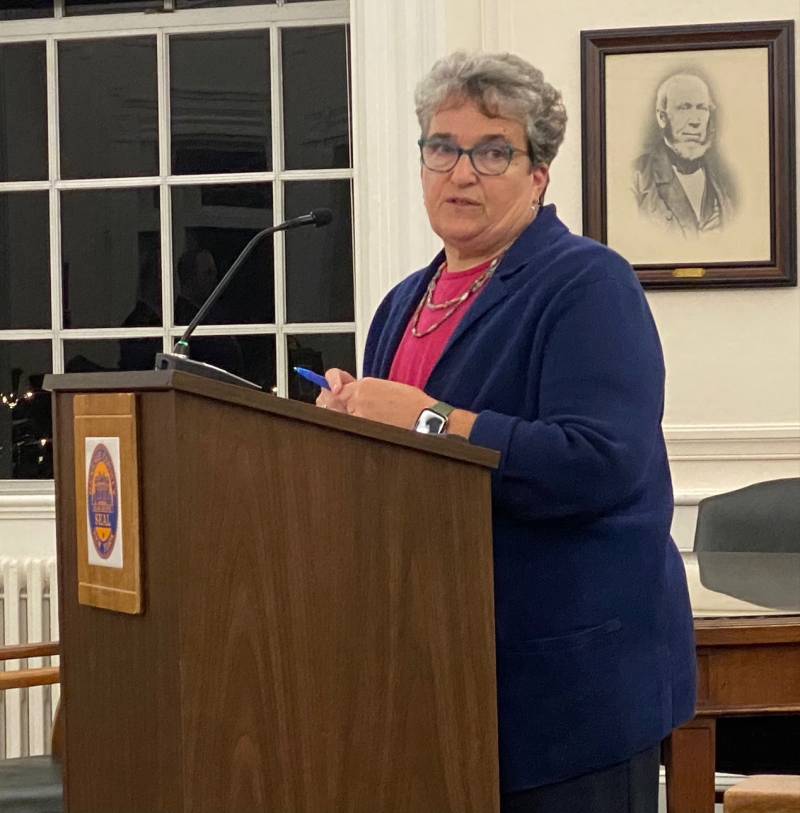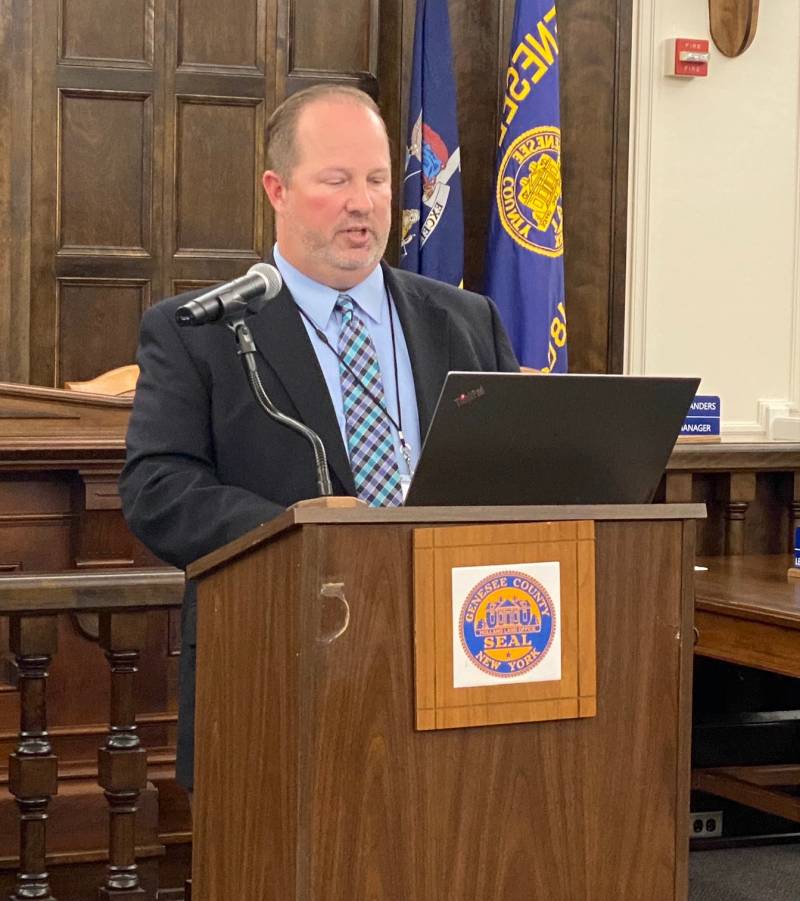
Photo by Joanne Beck
Sometimes, it’s the unspoken words that take center stage during something like a public budget hearing.
And the silence of no one who signed up to speak after Genesee County Manager Matt Landers presented his proposed nearly $1.9 million budget for 2025 indeed said something to Legislative Chairwoman Shelley Stein.
“The silence is meaningful because, as everyone is aware, all of our local government leadership is aware that sales tax revenue is down, and we aren't going to even make what we have budgeted for this year. And that was the pot of money that we had that was available to share,” Stein said after the hearing Wednesday at the Old County Courthouse. “But something that we do do is we make available to each community the opportunity to have the county pay for and provide a grant writer. So our communities are taking advantage of that, and you will see some of the recent wins that we've had in those communities. So, you know, a little bit of seed money that brings other people's money into the county has greater value than what we could do by giving an extra dollar of revenue distribution.”
In the last couple of years, at least one or two town supervisors have asked if the county could loosen the purse strings and allow more sales tax to be shared amongst the municipalities. During his talk, Landers explained that a lack of sales tax was a major challenge in creating this coming year’s budget.
So, as it stands, the proposed plan is a 3.4% increase, or $6,264,607, from this current year’s adopted budget. Reasons for the increase include a $1.9 million increase in preschool supportive health services program costs, $1.5 million in state retirement system cost increases, $727,000 increase in medical expenses, and $200,000 more in the 730 court-ordered competency evaluation costs, he said.
“We were able to hold the line for a couple of years, but just the second year in a row where we have sweeping cost increases on the medical side. This chart basically shows you know there's, we believe, no end in sight for mandate relief,” he said. “Over 95% of our property tax money goes directly to New York state-mandated costs. It'll be something that we continue to watch in the future. One of the fears we have is when the New York State Budget starts to go when it starts to become more challenging, and they do show how the reports that we get from NYSAC (New York State Association of Counties) indicate years of pledge deficits. There's always a fear that that just basically ends up resulting in a mandate push down to the counties. So when we're already at over 95% of our tax levy already on mandated services, there isn't much room to grow.”
With a shiny new $70 million county jail, that comes with $3.8 debt service payments in the general fund, plus operational, utility and contracted medical cost increases for the facility, he said.
“At this point, water expenditures continue to be funded with water revenues. But there is a looming $150 million Phase 3 of the water system that has us turning over every stone to try to minimize future general funding,” he said.
He has recommended using a property tax levy of $33,630,739 toward the budget, an increase of $908,362, or 2.78%, from this year. Due to increased property assessments, he said, the tax rate will decrease by 51 cents per $1,000 assessed value, lowering the current rate of $8.08 to $7.57 per $1,000 assessed value.
If the county Legislature adopts this budget, it would mean an annual bill of $757 for a property assessed at $100,000, versus this year's tab of $808, for a decrease of $51 if a homeowner has not had a property assessment increase.
However, if a home's value went up from $100,000 to $125,000, it would mean that a home that cost $808 yearly would now cost $946.25, for an overall yearly increase of $138.25 due to that increased assessment.
Landers wants to offset expenses by $2.5 million out of the county’s fund balance and $639,653 out of the Medical Reserve Fund. The budget would include $1 million for infrastructure spending on large span culverts; one full-time public works project manager and a part-time program assistant for the county park; 10 full-time corrections officers for the new county jail; and one each part-time financial clerk typist and discovery clerk for the Sheriff’s Office.
Infrastructure investments also include $4 million in capital projects for airport upgrades, building maintenance, information technology upgrades, Sheriff’s Office equipment upgrades — tasers, body cameras and guns — highway equipment replacement.
Annual payments of more than $500,000, per previously signed contracts, are also included for Mercy Flight and Le Roy Ambulance to provide dedicated ambulance service to the county, he said.
Listing three pages of budget challenges, Landers reviewed the rising employee retirement and medical costs, unfunded mandate increases, which include assigned counsel and 730 mental health restorative costs, and reduced sales tax — the first time since 2000 that sales tax revenues have declined year over year and falling under budget for 2024, he said.
The legal system is costing the county quite a chunk of money, to the tune of that extra $200,000 for the 730 mental health court and an additional $123,530 for assigned counsel costs, for a total spending of more than $1.8 million.
What is the 730 mental health court?
When a criminal suspect with mental health issues enters the justice system following an arrest, that defendant has a constitutional right to understand the proceedings, whether the defendant eventually ends up accepting a plea offer or facing trial.
In New York, that right is also protected by statute in Article 730 of the Criminal Procedure Law. The purpose of Article 730 is to ensure that a defendant is able to understand the charges against him or her and participate in his or her own defense.
Officials in Genesee County have wanted to see the law changed because it is outdated and getting increasingly more expensive with less efficiency than more contemporary options for dealing with a defendant's mental health capacity.
What is assigned counsel, and why are costs going up?
Assigned counsel costs "have been increasing drastically," primarily due to the state increasing the pay for assigned counsel attorneys from an hourly rate between $60 and 75 (depending on whether the offense was a misdemeanor or felony) to $158 an hour, more than doubling the cost of representation, Landers said.
“This is for people that both meet the financial criteria for publicly paid for representation and have a conflict that prevents representation by the Public Defender’s Office,” he said. “In 2022, the county spent $624,336 between Criminal Court and Family Court assigned counsel. In 2025, that budgeted figure has increased to $1,828,800.”
He thanked staff and department heads for the “team effort” to deliver an on-time budget that falls under the tax cap.
“I’m very happy that the legislature provided clear guidance. I feel like any time that I could reach out and communicate issues, this was my toughest budget because I didn't have a sales tax to help offset us … I felt like it was a team effort that department heads worked with me, delaying, pushing out costs in future years, if possible,” Landers said. “At this point, the budget is in the hands of the Legislature. Future budget meetings will be held to arrive at a consensus with the Legislature and make changes as recommended to manage the budgets. I hope for full adoption at the November 25 meeting, and feedback and input from the community is always welcome.”
Since the budget was just turned over to legislators, they would be reviewing and discussing it, Stein said, however, “when you have 98% of your tax levy as mandated services, it is really hard.”
“There’s almost nothing left to cut, and those things that we would cut are the highly valued quality-of-life issues such as our county park, such as our participation with our outside agencies of GO ART!, Cornell Cooperative Extension, our Workforce Development folks; those are not meaningful cuts, and so we appreciate the value that we can bring to our community through those, but also through our partners in our town, in our villages, in our city, where we offer them opportunities to participate with us, and they take advantage of that,” she said. “So we are happy to be a good partner, and we look for good partnerships because shared services is the only way that we’re going to get through what we have ahead of us today.”
For the full proposed 2025 budget, go HERE.

Photo by Joanne Beck
